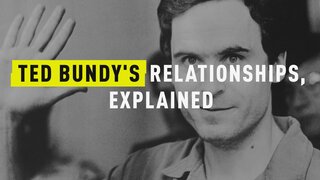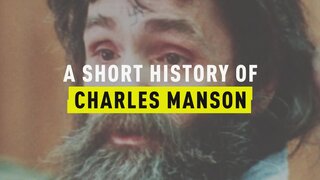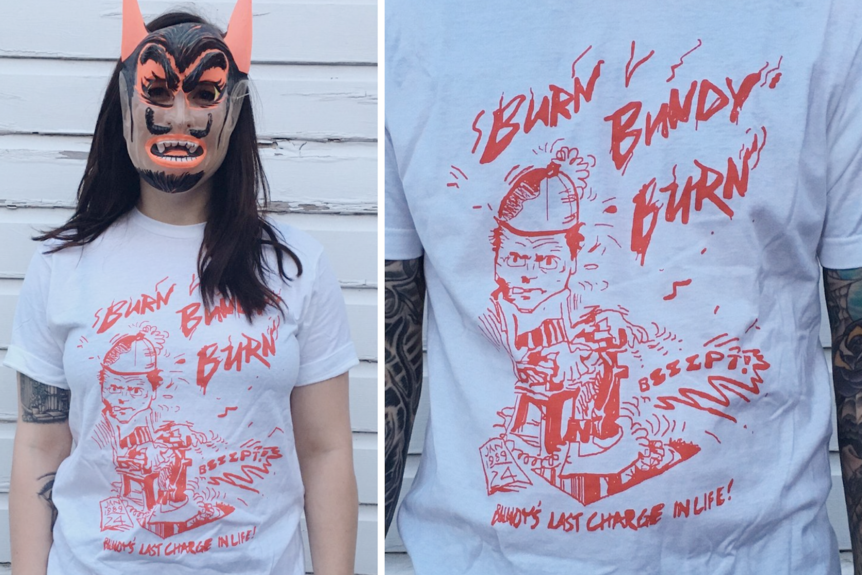Create a free profile to get unlimited access to exclusive videos, breaking news, sweepstakes, and more!
The Story Behind The 'Burn Bundy Burn' T-Shirts That Were Everywhere During Ted Bundy's Execution
"Burn Bundy Burn" became somewhat of a catchphrase around the execution of serial killer Ted Bundy in 1989 — and shirts donning the slogan continue to be sold on Etsy and beyond.
Serial killer Ted Bundy was finally executed on January 24, 1989 after confessing to more than 30 homicides. The American public had been transfixed by the trial of Bundy leading up to his death sentence — it was a veritable media circus complete with multiple trials, escapes, Bundy conducting his own defense, and an out-of-nowhere marriage proposal. Netflix's latest docu-series, "Conversations With A Killer: The Ted Bundy Tapes" even depicts righteous parties celebrating the capital punishment the brutal rapist and murderer was about to face, with some citizens wearing novelty T-shirts proclaiming "Burn Bundy Burn!" In fact, in the wake of Bundy's execution, artifacts belonging to Bundy or celebrating his demise proliferated in the public.
So what was the fate of this Bundy murderabilia — and why do people continue to seek out such objects in the first place?
Murderabilia, a term coined by victim advocate Andy Kahan, describes keepsakes pertaining to serial killers or other deadly criminals — often collected and sold through semi-legal black markets.
“Like it or not, it's human nature that people are going to be fascinated with the macabre," Kahan told Oxygen.com this past December. "You have an entertainment industry that basically revolves around one word: murder. When you look at the books, the movies, have you ever seen a bio about a crime victim? We all know who these killers are, they're household names. They're given infamy and immortality ... I think most people would agree with me: You shouldn't profit from criminal conduct."
Since his death, both legitimate and fake collectibles from Bundy have become available on the internet and at auction houses. The Marshall Project, a non-profit and non-partisan journalism organization that covers the American criminal justice system, noted that objects including Bundy's personal copy of his own biography had been on sale for nearly $10,000. Supernaughts, a Florida-based auction house, had Bundy's glasses offered at $75,000, according to The Telegram.
At the time of his execution, the "Burn Bundy Burn" shirt was somewhat of a local hot commodity. The phrase had become a kind of celebratory catchphrase in the days leading up to Bundy's death, with many excited Bundy would finally face justice. A 1989 UPI article notes that crowds had gathered under a full moon in Starke, Florida on the evening before the execution, waiting for the grisly killer's demise at dawn. Some were seen holding signs donning the morbid slogan amidst waving American flags. Cheers erupted when a signal was given that Bundy had finally been put down.
Not much information exists about who designed the original "Burn Bundy Burn" shirt imagery, nor are original or vintage versions of the product easy to track down. Depicting a cartoon of the scorched killer sitting in the electric chair, reproductions of the first run are now widely available on sites like HoodieLoves and TeePublic for prices ranging from $14-$20.
But sellers and buyers are intentionally distancing themselves from the politics implicit in the product.
"Selling these shirts comes from my legitimate interest in true crime history, not because I condone the death penalty!" reads seller TheDoubleRBazaar's description of the shirt, available on Etsy.
A serial killer enthusiast in New York City who preferred to remain anonymous explained how she came to own one of the "Burn, Bundy, Burn" reproductions. Her ethos also had little to do with the death penality.
"My boyfriend got it for me for Christmas. He only got it for me because the Ted Bundy authentic wanted poster was $400," she told Oxygen.com. "I love wearing this shirt because it tells a story ... I like a shirt with details."
Other collectors see the morbid humor in similar sartorial statements.
"I've got a 'This is Wisconsin. We eat people.' shirt," another enthusiast, who also asked not to be named, told Oxygen.com. "It's got Bundy and Dahmer on it. I got it over at Massive Magazine's website. I think its sort of funny. Wisconsin has a reputation for producing cannibal serial killers, so embracing that and making a gentle joke out of it is a bit of schadenfreude, I guess."
But are creators making some kind of statement with these clothes?
High-end designers have always flirted with ultra-violent couture: In recent memory, design duo The Blonds showed off models in dresses with sequined blood slashes in 2013, alongside gowns with famous horror villains printed on the fabric. The late Alexander McQueen famously used skulls and bones as motifs throughout his career. And on the lower end of the market, designs featuring kawaii killers are relatively commonplace through e-commerce sites.
For New York-based fashion designer Max Archimedes Levitt, utilizing serial killer-inspired imagery on edgy or chic clothing is a natural extension of our cultural obsession with deadly crime and has less of an overt partisan meaning with regards to specific policies about the electric chair or criminal justice.
"Getting inside the head of someone who willingly commits unspeakable horrors is unarguably fascinating," Levitt said to Oxygen.com. "And fashion is the art of wearing and making your insides — so it follows that if you're deeply intrigued by insanity so pungent you can taste it, you will explore it with your art. And if your art is fashion, congratulations — you're Ted Bundy by Dior."
[Photos: TheDoubleRBazaar Etsy]































